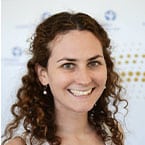AACR Maximizing Opportunity for New Advancements in Research in Cancer (MONARCA) Grant for Latin America
The AACR Maximizing Opportunity for New Advancements in Research in Cancer (MONARCA) Grant for Latin America represents an AACR initiative to address this need by promoting and supporting early career investigators in Latin America to establish a successful career path in cancer research, thereby increasing and sustaining a cadre of talented cancer researchers in Latin America.
2023 grantees

Research
Human Endogenous Retroviruses (HERVs) are remnants of ancient retroviruses that integrated into the human genome and can be reactivated under certain conditions, such as cancer. Dr. Batista aims to investigate the role of reactivated HERVs in triple-negative breast cancer (TNBC). Analyzing gene expression data from a biobank and The Cancer Genome Atlas, he seeks to identify differentially expressed HERVs, associated host genes, and potential links to adaptive immunity regulators. Significant progress in his work can demonstrate the potential of using reactivated HERVs as innovative biomarkers for TNBC diagnosis, prognosis, and treatment response assessment.
Biography
Dr. Batista obtained his medical degree from the Federal University of Santa Maria. He pursued further medical specialization by completing an internal medicine and endocrinology residency. Subsequently, he obtained a doctorate in endocrinology from the University of Sao Paulo. Following his doctoral studies, he conducted postdoctoral research at the McKusick/Nathans Institute of Genetic Medicine at Johns Hopkins Medical School. Since 2019, he has held the position of clinician researcher at the Institute of Cancer of Sao Paulo affiliated with Sao Paulo University. In this role, he contributes to both clinical practice and conducts research related to hormones and cancer.
Acknowledgement of Support
Raising public funds for research in Brazil is exceptionally challenging due to the lack of government policies that support science. Therefore, recognizing the potential to generate impactful translational data, the AACR opportunity is of utmost importance to us. It represents a crucial avenue through which we can obtain the necessary resources to advance our research efforts and contribute to the field of cancer science.

Research
The landscape of lung cancer genomes of Latin-American populations has not been comprehensively described. On the one hand, Latin-American patients are commonly underrepresented in both clinical trials and epidemiological studies and appear to present higher incidence and mortality rates in comparison to the developed world. On the other hand, this population is comprised of mixed ancestry backgrounds and is also affected by specific patterns of environmental exposures. This research project attempts to close this knowledge gap by investigating the effect that inherited genetic constitution and non-genetic characteristics exert on the genomic landscape of this population; furthermore, we aim to investigate the combined effect of these factors on the clinical course of the disease.
Biography
Dr. Garrido completed her undergraduate degree at the University of Chile. She then continued her academic development with postgraduate studies at Imperial College London (London, UK) where she was awarded a master’s degree and a doctorate in epidemiology and biostatistics. Her research interests mainly relate to the application of novel statistical approaches and computationally efficient models to provide mechanistic insight into the onset and progression of complex non-communicable chronic diseases. Her current work is focused on elucidating the interplay between inherited genetic constitution, acquired genetic alterations, and population-specific exposure structures with the clinical course of lung cancer.
Acknowledgement of Support
“The AACR Maximizing Opportunity for New Advancements in Research in Cancer (MONARCA) Grant for Latin America is the first grant I have received as an independent researcher, and I am honored and humbled to have been given this remarkable opportunity. I will work very hard to make the most of this achievement and to further the scope of cancer epidemiology research in Latin-America.”

Research
The role played by Th17 cells in cancer immunity and immunotherapy is highly controversial with both anti-tumor and pro-tumor effects being reported. Dr. Russo and her colleagues will study a possible new intrinsic regulator of Th17 cells, TMEM176B. Their preliminary results show that TMEM176B is associated with Th17 cell polarity in the context of PD-1 blockade. They plan to characterize whether and how intrinsic TMEM176B expression controls the anti-tumoral capacity of Th17 cells, characterizing whether TMEM176B controls cooperation of Th17 cells with exhausted CD8+ T cells. They will also evaluate if there is a correlation between TMEM76B expression in Th17 cells and CD8+ T cell exhaustion in tumor biopsies from patients treated with PD-1 blockers.
Biography
Dr. Russo studied at the University of the Republic, Uruguay, where she obtained an undergraduate degree in biochemistry and a master’s degree and doctorate in cellular and molecular biology. She then completed a year as a postdoctoral fellow at the Institut Pasteur de Montevideo. Presently, she holds a position as an assistant professor in the Immunobiology department of the Medical School, University of the Republic.
Acknowledgement of Support
“The AACR Maximizing Opportunity for New Advancements in Research in Cancer (MONARCA) Grant for Latin America will drastically improve the quality of our research focusing on Th17-exhausted CD8+ T cell cooperation in the context of cancer immunotherapy. Personally, this project will mark a milestone in my career as it brings me closer to my goal of becoming an independent researcher.”